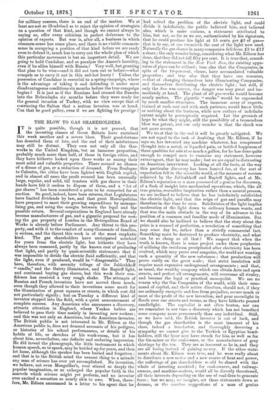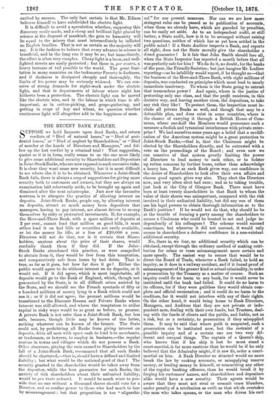THE BLOW TO GAS SHAREHOLDERS.
IT is quite possible, though it is not proved, that the investing classes of Great Britain have sustained this week another and a severe blow. Their good-fortune has deserted them of late, and the end of their misfortunes may still be distant. They own not only all the Gas- works in the United Kingdom, but an immense proportion, probably much more than half, of those in foreign cities, and they have hitherto looked upon these works as among their most solid and valuable properties. There seemed no chance of a disuse of gas, or a reduction of demand. From Boulogne to Calcutta, the cities have been lighted with English capital, and in almost all cases the profit secured has been unusually large, regular, and solid, till trustees with gas shares in their hands have felt it useless to dispose of them, and a "lot of
gas shares" has been considered a prize to be competed for at auction. So good, indeed, have been returns, that Legislatures have limited dividends by law, and that great Municipalities have proposed to meet their growing expenditure by monopo- lising gas, and using the margin between the legal and the possible return. Several corporations in England have already become manufacturers of gas, and a gigantic proposal for vest- ing the gas property of London in the Metropolitan Board of Works is already before Parliament. Any threat to this pro- perty, and with it to the comfort of many thousands of families, is serious, and the threat this week is of the most emphatic
kind. The gas shareholders have anticipated mischief for years from the electric light, but hitherto they have always been reassured, partly by the known cost of producing that light, and partly by quasi-scientific statements that it was impossible to divide the electric fluid sufficiently, and that the light, even if produced, would be "disagreeable." They bore, therefore, with serenity tidings of the Jablochkoff "candle," and the Gaiety illuminator, and the Rapieff light, and continued buying gas shares, but this week their con- fidence has received a very rough shake. The attempts of Russian and French inventors have not moved them much, even though they allowed to their inventions some merit for the illumination of great squares or streets, in which cost did not particularly signify ; but on Tuesday a different kind of inventor stepped into the field, with a quiet announcement of complete success. Any American who announces a discovery, attracts attention in England, where Yankee babies are believed to pass their time mainly in inventing new rockers ; and this was not only an American, but the American inventor. The British public is not interested in Mr. Edison as the American public is, does not demand accounts of his pedigree, or histories of his school performances, or details of his habits of life, or sketches of his work-room, but it has about him, nevertheless, one definite and enduring impression. He did invent the phonograph, the little instrument in which human speech, so to speak, may be bottled up for years, and then let loose, although the speaker has been buried and forgotten ; and that is to the British mind the nearest thing to a miracle any man of science has ever yet accomplished. No invention, we believe, not even Mongolfier's, ever stirred so deeply the popular imagination, or so enlarged the popular faith in the marvels which science might yet perform, and no inventor ever excited a sensation so nearly akin to awe. When, there- fore, Mr. Edison announced in a letter to his agent that he
had solved the problem of the electric light, and could divide it indefinitely, the public believed him, and believed
also, which is more curious, a statement attributed to him, but not, so far as we see, authenticated by his signature, that he could produce his light at 15 cents. per $3 of gas—
that is to say, at one twentieth the cost of the light now used.
Naturally the gas shares in many companies fell from £3 to £17 a share ; the only wonder being, considering what Mr. Edison has
done, that they did not fall fifty per cent. It is true that, accord- ing to the statement in the New York Sun, the existing appa- ratus of pipes can be utilised ; true also that the Companies, in spite of the 10-per-cent. clause, have accumulated valuable properties ; and true also that they have one resource, —that of changing themselves into illuminating Companies, and themselves distributing the electric light ; but still, if only the Sun was correct, the danger was very great and im- mediately at hand. The plant of all gas-works would become nearly useless. The gigantic " works " would be superseded by much smaller structures. The immense array of experts, trained at such cost and with such patience, would know little or nothing about the business, while new outlays of indefinite extent might be peremptorily required. Let the grounds of hope be what they might, still the possibility of a tremendous blow was patent, and our only wonder is that the shock was not more severe.
We trust that in the end it will be greatly mitigated. We are not equal to the task of doubting that Mr. Edison, if he says so, has invented any machine whatever, has compressed thought into a metal, or liquefied pain, or bottled happiness of three qualities for sale at so much a gallon, for he has done quite enough to compel men to examine any statement, however extravagant, that he may make ; but we are equal to distrusting an American interviewer. Looking at all the facts, at the way this particular discovery has been hunted for, at the sort of expectation felt in the scientific world, at the measure of success achieved by the Jablochkoff and Rapieff lights, and at Mr. Edison's reputation as a man possessed of a genius for discovery, of a flash of insight into mechanical operations, which, like all true genius, resembles inspiration rather than a mental process, we are inclined to believe that he has indefinitely subdivided. the electric light, and that the reign of gas and paraffin may therefore in due time be over. Subdivision of the light implies moderation of the light down to ordinary human wants, and that was the main obstacle in the way of its advance to the position of a common and familiar mode of illumination. But we should also be inclined to believe that the story about the price is a counsel of perfection, a revelation of something that may some day be, rather than a strictly commercial fact. Something must be destroyed to produce electricity, and what can be so cheap as all that ? We suspect that when the truth is known, there is some project under these prophecies of utilising the residuum precipitated after electricity has been evolved, which may prove over sanguine, the world not wanting such a quantity of the new substance ; that production will prove costly on the great scale ; that strict insulation will require most expensive underground arrangements ; and that, as usual, the wealthy company which can obtain Acts and open streets, and perfect all arrangements, will overcome all rivalry, and become the legal or practical monopolist. We see no reason why the Gas Companies of the world, with their com- mand of capital, and their active directors, should not, if they are ordinarily energetic and free from prejudice, secure much or most of the profit of the new invention, and pour moonlight in floods over our streets and rooms, as they have hitherto poured candlelight. The capitalist is not often beaten, nor can we remember in our time a discovery which has not benefited some company more permanently than any individual. Still, as we have said, the British investor is out of luck, and though the gas shareholder is the most innocent of his class, indeed a benefactor, and thoroughly deserving a sympathy we cannot give to the Turkish or Egyptian bond- holders, still the hour may have struck for him as well as for the tin-miner or the coal-owner, or the manufacturer of gray
shirtings by the ton. They are as innocent as he is, and they are all losing instead of gaining money. If the other state- ments about Mr. Edison were tree, and he were really about
to distribute a new motor and a new source of heat and power, the sufferings of gas shareholders would be shared with the whole of investing mankind ; for coal-owners, and railway-
owners, and machine-makers, would all be directly threatened, all their interests depending on the use of coal-fires to generate force ; but we may, we imagine, set these statements down as dreams, or the careless suggestions of a man of genius
excited by success. The only fact certain is that Mr. Edison believes himself to have subdivided the electric light.
It is difficult to avoid a speculation whether, supposing this discovery really made, and a cheap and brilliant light placed by science at the disposal of mankind, the gain to humanity will be equal to the misery that must intermediately be inflicted on English families. That is not as certain as the majority will say. It is the fashion to believe that every advance in science is beneficial, and in the long run it may be so; but immediately, the effect is often very complex. Cheap light is a boon, and well- lighted streets are easily protected ; but there is, per contra, a heavy increase of toil possible to the world. The great limi- tation in many countries on the taskmaster Poverty is darkness, and if darkness is dissipated cheaply and thoroughly, the limits of his power may be seriously widened. We can con- ceive of strong demands for night-work under the electric light, and that in departments of labour where night has hitherto been a protection. The electric light can be moved like the electric wire, and in the labour in which time is all- important, as in cotton-picking, and grape-gathering, and getting in crops of hay and wheat, we question whether continuous light will altogether add to the happiness of man.



































 Previous page
Previous page